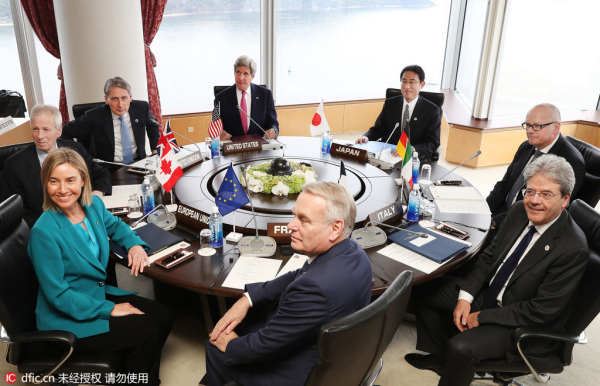Regional disputes should not be on the agenda at G7 summit
Updated: 2016-04-18 08:24
By Cai Hong(China Daily)
|
||||||||
 |
|
US Secreatary of State Johon Kerry (background, L) and G7 countries foreign ministers, attend the first round of meeting, hosted by Japanese Foreign Minister Fumio Kishida (foreground, R) at a Hotel in Hiroshima Prefecture on April 10, 2016.[Photo/IC] |
With the G7 leaders convening in Japan this year, Prime Minister Shinzo Abe is eager to drive home the message that Japan is both a regional and a global leader.
Abe's ambitious foreign policy has already made him the most traveled Japanese leader in history. In just three years, Abe has visited more than 63 countries and held more than 400 summits.
As part of this policy, Japan has been seeking to make a military and political comeback in the strategically important region of the South China Sea. To this end, it has been working hard to improve relations with countries, such as Vietnam, the Philippines and Indonesia.
Now, as the chair of the upcoming G7 summit, Abe wants to showcase his country's global leadership credentials by pushing the "challenges" facing the Asia-Pacific region on the agenda of the high-profile international forum.
The G7 foreign ministerial meeting in Hiroshima last weekend seemed to set the tone for the summit of the leaders of Canada, France, Germany, Italy, Japan, the United Kingdom, and the United States in central Japan on May 26 and 27.
In a joint statement issued after their meeting, the G7 foreign ministers poked their nose into the territorial disputes in the East and South China Seas.
"We express our strong opposition to any intimidating, coercive or provocative unilateral actions that could alter the status quo and increase tensions, and urge all states to refrain from such actions as land reclamations, including large scale ones, building of outposts, as well as their use for military purposes and to act in accordance with international law including the principles of freedom of navigation and overflight," their statement said.
Chinese Foreign Minister Wang Yi has urged Japan to leave the issue of the South China Sea out of the agenda of the summit. None of the G7 countries represents the South China Sea region, and they should not concern themselves with the issue. China and the countries concerned can deal with their territorial disputes by themselves.
- Global health entering new era: WHO chief
- Brazil's planning minister steps aside after recordings revelation
- Vietnam, US adopt joint statement on advancing comprehensive partnership
- European border closures 'inhumane': UN refugee agency
- Japan's foreign minister calls A-bombings extremely regrettable
- Fukushima impact unprecedented for oceans: US expert

 Stars of Lijiang River: Elderly brothers with white beards
Stars of Lijiang River: Elderly brothers with white beards
 Wealthy Chinese children paying money to learn British manners
Wealthy Chinese children paying money to learn British manners
 Military-style wedding: Fighter jets, grooms in dashing uniforms
Military-style wedding: Fighter jets, grooms in dashing uniforms
 Striking photos around the world: May 16 - May 22
Striking photos around the world: May 16 - May 22
 Robots help elderly in nursing home in east China
Robots help elderly in nursing home in east China
 Hanging in the air: Chongqing holds rescue drill
Hanging in the air: Chongqing holds rescue drill
 2.1-ton tofu finishes in two hours in central China
2.1-ton tofu finishes in two hours in central China
 Six things you may not know about Grain Buds
Six things you may not know about Grain Buds
Most Viewed
Editor's Picks

|

|

|

|

|

|
Today's Top News
Liang avoids jail in shooting death
China's finance minister addresses ratings downgrade
Duke alumni visit Chinese Embassy
Marriott unlikely to top Anbang offer for Starwood: Observers
Chinese biopharma debuts on Nasdaq
What ends Jeb Bush's White House hopes
Investigation for Nicolas's campaign
Will US-ASEAN meeting be good for region?
US Weekly

|

|








